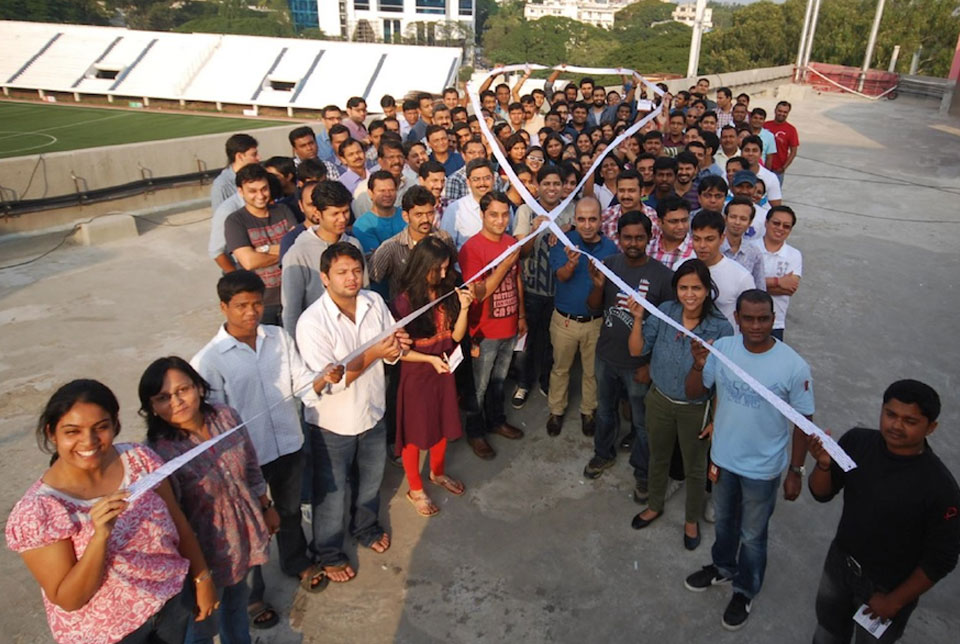Educating employees about HIV/AIDS is one of our biggest initiatives at Levi Strauss & Co. We understand that HIV/AIDS education isn’t just a good idea, it’s vital to communities across the globe.
Unzipped spoke with Joanne Lim-Pousard on our Human Resources team. She’s the senior manager of the Employee HIV/AIDS Program at LS&Co., and she talked with us about some of the work the company is doing to educate employees about HIV/AIDS and to influence policy in countries around the world.
UNZIPPED: What does your role entail?
JOANNE LIM-POUSARD: My role is to ensure LS&Co. employees and their families globally have access to HIV education, treatment and care.
A large part of that is training our employees in retail stores, offices, factories and distribution centers so that they know how HIV is transmitted — and also to foster anti-stigma and nondiscrimination in the workplace. We have a global workplace policy on ensuring nondiscrimination and confidentiality of HIV status. We also provide an Employee HIV/AIDS Benefit Plan that reimburses employees for the costs of HIV/AIDS-related testing, treatment and care in countries where it’s excluded from local insurance plans and isn’t adequately covered by government or social services.
What kind of materials does LS&Co. use to educate employees about HIV/AIDS?
We use a lot of video storytelling in our education efforts. We try to show how HIV/AIDS impacts employees in actual situations they might face in the workplace.
Globally, what kind of employee education does LS&Co. provide?
We have a global framework, regardless of what country the program is in, but we are also locally adaptive. We partner with local nonprofit groups in various countries to promote HIV/AIDS education.
We also try to promote positive change in communities around the world. Recently, CEO Chip Bergh signed a pledge calling on governments to stop travel restrictions on employees diagnosed with HIV/AIDS. In Singapore, for instance, you have to take an HIV test if you want to stay longer than 30 days, and you could be deported if you’re HIV-positive.
When you need to move your people around in a global company, it has real implications not just for the employees, but also on the bottom line. Chip joined CEOs from about 50 countries calling on governments to help. We use the voice of the company to try to have an impact on issues that affect our employees.
Have you had success in trying to encourage insurers in other countries to change restrictive HIV/AIDS policies?
We’ve had some real successes for our employees. For example, we found that in some countries, local insurers imposed waiting periods or limitations on when HIV-related benefits could be accessed. So far, we’ve managed to negotiate away a five-year waiting period in Hong Kong and a four-year waiting period in Mexico, and we removed the pre-existing condition exclusion for employees with HIV/AIDS in Taiwan — but still, it’s a long process.
It’s recently come to light that HIV/AIDS is a growing issue in Russia. Can you tell us about the resources LS&Co. provides for employees working there?
In Russia, we partner with our local HR team and nonprofit partner, Health Development Fund, to provide local context. Our annual trainings focus on prevention, dispelling transmission myths, and stigma and discrimination at work, as well as Russian legislation and legal aspects of HIV/AIDS.
What financial resources does the company offer for employees affected by HIV/AIDS?
Currently, the company will pay 100 percent of HIV-related costs for eligible employees and dependents through our Employee HIV/AIDS Benefit Plan. But our ideal is really that employees will access their HIV/AIDS medical benefits the way they access other medical benefits and not have to go through a separate plan. It’s a slower process, but we’re working with local insurance companies in countries where it’s market practice to exclude HIV from their standard plans to negotiate for improved coverage.
What is the educational approach in countries where HIV/AIDS is more prevalent, such as in South Africa?
In South Africa, in addition to awareness and education, we provide an annual onsite HIV testing campaign, which is free to employees and their dependents. In some of the more developed countries, education revolves more around prevention, whereas in South Africa and other places where HIV/AIDS is more prevalent, while prevention is still key, we also emphasize getting tested and then getting treatment for anyone who is HIV-positive.
What approach does LS&Co. take in the U.S.?
Our approach varies depending on employee location. For example, in offices, we rely a bit more on email, our internal blog and video-based educational materials. In the distribution centers in Sky Harbor, Nevada, Canton, Mississippi and Hebron, Kentucky, we partner with local NGOs to provide one-hour training sessions. And in retail stores, our store managers play a key role in cascading information to associates. We also have a very active Community Involvement Team, the AIDS Action Group, which allows for increased awareness during events like the AIDS Walk.
In the U.S., because HIV is covered by our medical insurers, we offer a hotline called HIVConnect, which is managed by a third-party vendor. It’s a counseling line that our employees can call if they need help navigating their insurance plans or community resources.
What are the repercussions of HIV/AIDS discrimination in the workplace?
We take it very seriously if we find out about incidences of discrimination. It is our policy, globally, to investigate it and treat it as it arises.
What are the most challenging and rewarding parts of your work?
I think what’s most challenging is that in certain developing countries, HIV/AIDS awareness isn’t as prevalent as it is in other places. A part of what this company believes in is overcoming that perception and saying: We’ve come a long way — and while there’s a lot of progress, this is a critical juncture in the fight against HIV/AIDS and we can really end this if we put enough resources and effort into it and see this through to the end.
What’s most rewarding is seeing some of our employees who have been affected by HIV and AIDS really gaining a voice — coming forward and becoming champions and great voices against discrimination, in addition to sharing their own stories —that’s been really inspirational. I feel like our organizational culture really fosters an open environment to allow these voices to come up — and helping to facilitate that has been the most rewarding thing for me.
For more information about LS&Co.’s Employee HIV/AIDS Program, visit www.hivaids.levi.com or email hivaids@levi.com.








